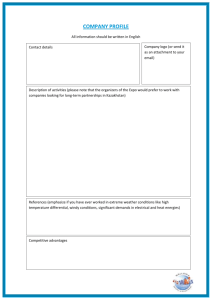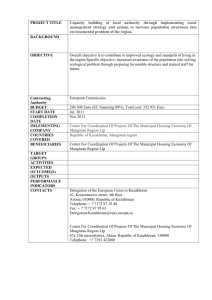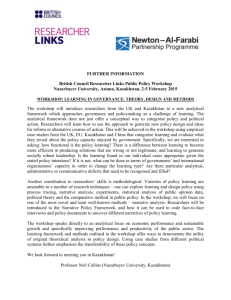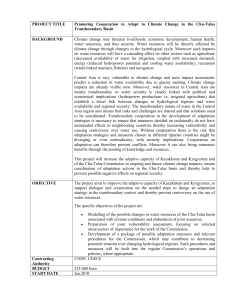Terms of Reference - UNDP in Kazakhstan
advertisement
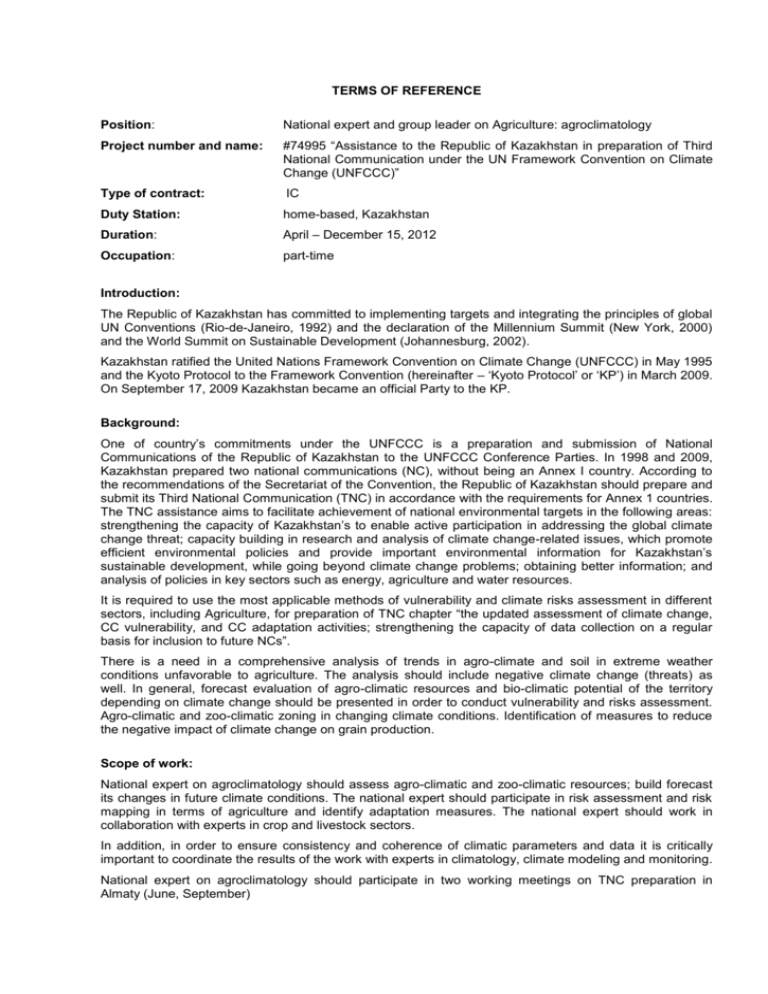
TERMS OF REFERENCE Position: National expert and group leader on Agriculture: agroclimatology Project number and name: #74995 “Assistance to the Republic of Kazakhstan in preparation of Third National Communication under the UN Framework Convention on Climate Change (UNFCCC)” Type of contract: IC Duty Station: home-based, Kazakhstan Duration: April – December 15, 2012 Occupation: part-time Introduction: The Republic of Kazakhstan has committed to implementing targets and integrating the principles of global UN Conventions (Rio-de-Janeiro, 1992) and the declaration of the Millennium Summit (New York, 2000) and the World Summit on Sustainable Development (Johannesburg, 2002). Kazakhstan ratified the United Nations Framework Convention on Climate Change (UNFCCC) in May 1995 and the Kyoto Protocol to the Framework Convention (hereinafter – ‘Kyoto Protocol’ or ‘KP’) in March 2009. On September 17, 2009 Kazakhstan became an official Party to the KP. Background: One of country’s commitments under the UNFCCC is a preparation and submission of National Communications of the Republic of Kazakhstan to the UNFCCC Conference Parties. In 1998 and 2009, Kazakhstan prepared two national communications (NC), without being an Annex I country. According to the recommendations of the Secretariat of the Convention, the Republic of Kazakhstan should prepare and submit its Third National Communication (TNC) in accordance with the requirements for Annex 1 countries. The TNC assistance aims to facilitate achievement of national environmental targets in the following areas: strengthening the capacity of Kazakhstan’s to enable active participation in addressing the global climate change threat; capacity building in research and analysis of climate change-related issues, which promote efficient environmental policies and provide important environmental information for Kazakhstan’s sustainable development, while going beyond climate change problems; obtaining better information; and analysis of policies in key sectors such as energy, agriculture and water resources. It is required to use the most applicable methods of vulnerability and climate risks assessment in different sectors, including Agriculture, for preparation of TNC chapter “the updated assessment of climate change, CC vulnerability, and CC adaptation activities; strengthening the capacity of data collection on a regular basis for inclusion to future NCs”. There is a need in a comprehensive analysis of trends in agro-climate and soil in extreme weather conditions unfavorable to agriculture. The analysis should include negative climate change (threats) as well. In general, forecast evaluation of agro-climatic resources and bio-climatic potential of the territory depending on climate change should be presented in order to conduct vulnerability and risks assessment. Agro-climatic and zoo-climatic zoning in changing climate conditions. Identification of measures to reduce the negative impact of climate change on grain production. Scope of work: National expert on agroclimatology should assess agro-climatic and zoo-climatic resources; build forecast its changes in future climate conditions. The national expert should participate in risk assessment and risk mapping in terms of agriculture and identify adaptation measures. The national expert should work in collaboration with experts in crop and livestock sectors. In addition, in order to ensure consistency and coherence of climatic parameters and data it is critically important to coordinate the results of the work with experts in climatology, climate modeling and monitoring. National expert on agroclimatology should participate in two working meetings on TNC preparation in Almaty (June, September) Expected results and payments: No Results Timing Amount 1. Analysis of current status and trends in agro-climatic resources of heating and water provision on the territory, in terms of plants. Analysis of current status and trends in zoo-climatic resources on the territory by its favorability to livestock. Result: analytical report April 30% 2. Analysis of trends in weather conditions (drought, frost) unfavorable for crop production. Analysis of trends in weather conditions (extreme cold and extreme heat) unfavorable for livestock. Identification of its negative change (threats) Result: analytical report April - May 3. Probabilistic forecast of agro-climatic status of crop cultivation in changing climate conditions. Probabilistic forecast of zoo-climatic status of farm animals keeping in changing climate conditions. Forecast of its impact on grain production and livestock. Result: technical report June - July 4. Agro-climatic zoning of the Republic by heat and water provision to cereal in changing climate conditions. Zoo-climatic zoning of the Republic in terms of livestock in changing climate conditions. Result: analytical report with recommendations and data tables AugustSeptember 5. Identification of adaptation measures on climate change negative impact on crop and livestock sectors. Coordination of experts on Agriculture (crop and livestock sectors). Preparation of necessary climate data to the experts. Systematization and integration of their reports. Participation in two working meetings. Result: general report on vulnerability and adaptation of Agriculture to climate change April - November 30% 40% Responsibility: The expert should: Report to Team Leader on adaptation and vulnerability and Project Manager; Coordinate his actions with the Team Leader and other national experts of the project; Ensure timely and quality execution of the Terms of Reference; Ensure unconditional carrying out of requirements of the Contract; Prepare an extended Power Point presentation using main results of his work. The reports and materials should be submitted in Russian using electronic format of MS Word (version 2007 or later), Excel or other processing system database; font Arial, size 12. Knowledge and skills: Higher education in the field of Agroclimatology, Climatology, Agriculture or other relevant fields; At least 10 years of experience in research and analytical work in the relevant field; Experience in preparation of analytical reviews and materials in the format adopted by international organizations; Knowledge of Agriculture sector in the Republic of Kazakhstan; Knowledge of the subject of prevention and adaptation to climate change; Knowledge of general models and approaches to assessment of climate change vulnerability in Agriculture sector; Work experience in assessment of climate change impact, vulnerability and climate risks assessment is preferred.
